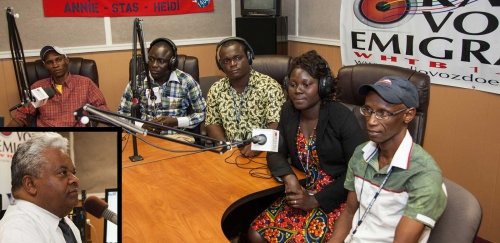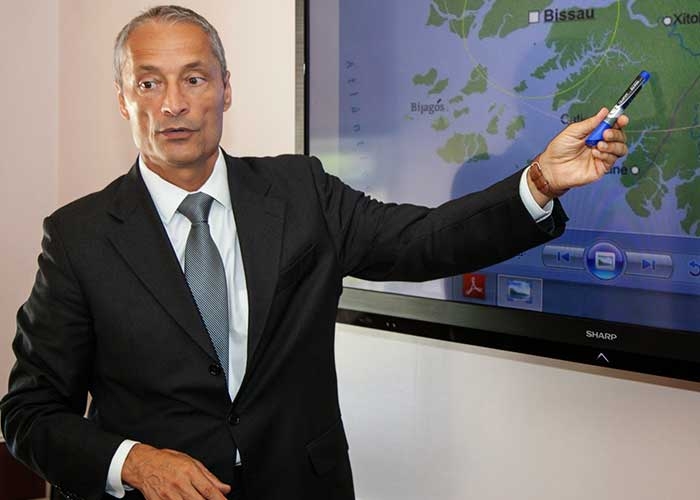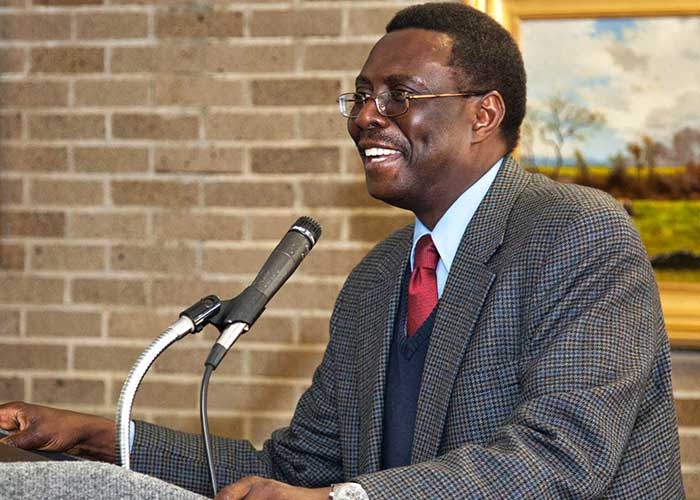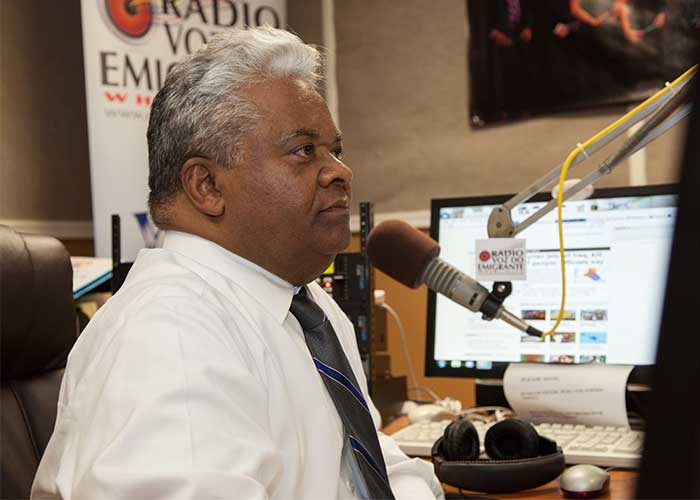Journalists From Guinea-Bissau Adapt to America Before Beginning Study at RIC
- News & Events
- News
- Journalists From Guinea-Bissau Adapt to America Before Beginning Study at RIC

Director and Producer of WHTB Rádio Voz Do Emigrante Frank Baptista (bottom left) gives tour of his radio station to team of Guinea-Bissau journalists.
In Guinea-Bissau, a former colony of Portugal, the radio is the primary means of communication.
From June 19 through July, five radio broadcast journalists from Guinea-Bissau will take part in a new certificate program in peace journalism at Rhode Island College to learn best practices in reporting and ethics. Preparation for their course work at RIC began with a two-week orientation to campus life and to America.
The team of reporters who hail from Rádio Sol Mansi (Radio Sunrise) consist of Amadu Uri Djaló, editor-and-chief, (Djaló oversees 40 national correspondents and 30 journalists); Anabela Bull Ramalho, program director; Casimiro Cajucan, producer and journalist; Mamadu Saido Embaló, chief technician; and Armando Mussá Sani, trainer in the Portuguese language.
Rhode Island College was selected as a training site by the Pro Dignitate Foundation for Human Rights in Lisbon, Portugal, because of the global mission of RIC’s Institute for Portuguese and Lusophone World Studies and because of the college’s location – Rhode Island has the highest concentration of Portuguese people, including Portuguese-speaking Cape Verdeans, in the United States.
The Institute and Pro Dignitate signed an accord in 2010, agreeing to work together to promote peace in Portuguese-speaking Africa, with specific focus on radio broadcasting. According to RIC Professor Peter Mendy, a member of the Academic Advisory Council for the Institute, the purpose of the two-week orientation was to train the journalists in “survival” English – words and phrases that will allow the non-native speakers to navigate on campus and off, while acclimating to life in America.
They also participated in a weeklong professional development workshop on the international dimension of journalism led by Pedro Bucado, international journalist and former Washington correspondent for Portuguese Public Television RTP.

“Training has been a very hands-on, journalism-intensive practice,” said Bucado. “Taking their reality as a first step, we’ve been working on standards and formats that could help them improve their work at Rádio Sol Mansi. This is a Catholic ecumenical radio station where Islamic and Christian content is carried equally – 50 percent of Guinea-Bissau is Islamic, 10 percent are Christians and 40 percent are Animists. These are young but seasoned professionals looking to improve their journalism practices and contribute to freedom of the press in a democracy.”
Peace journalism is critical for Guinea-Bissau and for Africa in general, said Professor of History Peter Mendy, whose research focuses on democratization and war-to-peace transitions in Lusophone (Portuguese-speaking) Africa, particularly Guinea-Bissau.
Mendy’s ties to Guinea-Bissau are also personal; his parents were born there.

Although the country has been independent for 41 years, its independence has been a tumultuous one, with numerous coups d’etat, presidential and political assasinations and military influence on the government.
Because most people cannot afford television and the literacy rate is low, they rely on radio, which is rife with biased political reporting, said Mendy. In Africa, this leads to violence. “It was because of radio journalists that the Rwandan genocide was so effective,” he said. “Lists of people to be slaughtered were read by journalists over the radio.”
Similarly, in Guinea-Bissau, during and after elections, much of the violence was, and continues to be, propagated through the radio, he said.
Though the five visiting journalists will explore best practices in broadcast journalism, the certificate program they are enrolled in is called peace journalism. “Peace journalism is an effort to establish and maintain peace through ethical reporting when countries are in conflict,” Mendy explained.
The journalists also toured two Portuguese-American radio stations – WJFD Radio Globo in New Bedford and WHTB Rádio Voz Do Emigrante in Fall River – where they discussed the challenges of reporting during times of conflict and the new opportunity that has come out of recent democratic elections that took the military out of power.

They plan to fly back to Guinea-Bissau today and return to RIC over the next two summers to complete the certificate program. The four courses, which make up the program, will be taught by Portuguese-speaking journalists.
The hope, said Marie Fraley, director of the Institute for Portuguese and Lusophone World Studies, is that through this orientation, “they’ve become comfortable in the United States and they’ve gained a different perspective on journalism. A program like this is important because it strengthens our international connections with other Portuguese-speaking cultures around the world.”
